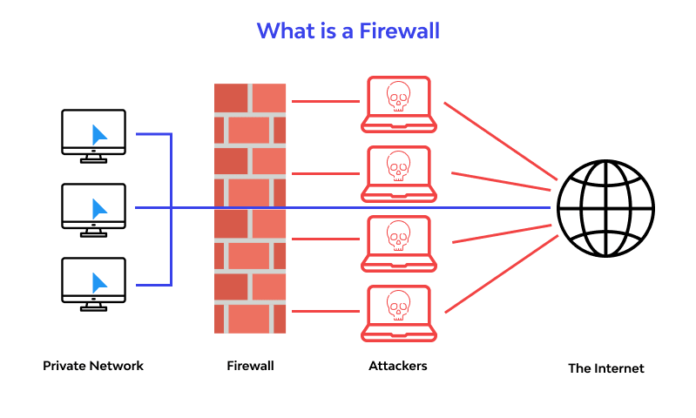In today’s digital world, safeguarding our online data and personal information is more important than ever. Cyberattacks, data breaches, and online threats are growing more advanced, making it vital to implement strong security measures. A firewall is one of the key components in any security strategy. But what exactly is a firewall, and why is it essential for your network and devices? Let’s delve into the significance of having a reliable firewall and how it can shield your system from potential dangers.
What Is a Firewall?
A firewall is a security tool, either hardware or software, that oversees and regulates the flow of incoming and outgoing network traffic according to set security rules. It serves as a protective barrier between your internal network (or device) and external sources, blocking unauthorized access while permitting legitimate communication. The main goal of a firewall is straightforward but essential: to safeguard your data, devices, and networks from various cyber threats, including malware, hacking attempts, and unauthorized access.

Types of Firewalls
There are various types of firewalls, each tailored for specific purposes and providing distinct advantages:
- Network Firewalls: The most common type of firewall, a network firewall, filters traffic between your internal network and external sources like the internet. Notable examples include Cisco firewall, Palo Alto firewall, and Azure firewall.
- Application Firewalls: These firewalls focus on filtering traffic specific to applications, blocking harmful traffic that targets software vulnerabilities. For instance, VPN firewall settings are designed to secure VPN connections.
- Hardware Firewalls: These are tangible devices positioned between your network and the internet, providing robust protection. Well-known hardware firewalls include the Sophos firewall v20 and Palo Alto firewall.
- Software Firewalls: Installed directly on individual devices such as PCs, routers, or servers, software firewalls offer an additional layer of security. Examples are Windows firewall, Mac firewall, and Linux firewall.
Why is a Good Firewall Important?
Having a strong firewall is crucial for several reasons, particularly in a time when online threats are continuously changing. Here are the key benefits to consider:
1. Network Protection
A network firewall serves as the initial barrier against cyberattacks. Whether you utilize a firewall router or a dedicated firewall server, it effectively blocks unwanted traffic from accessing your network, safeguarding your devices from viruses, malware, and hackers. Ensuring proper firewall security allows only legitimate traffic to enter your internal network.
2. Control Over Traffic
With customizable firewall rules, you have the flexibility to specify which types of traffic are permitted and which ones should be denied. For instance, you can set up your firewall to block potentially harmful IP addresses or limit access to specific ports. Additionally, firewalls allow you to verify proxy and firewall settings to make sure that only authorized connections are made.
3. Data Security
A firewall protects your sensitive data by blocking unauthorized access attempts from outside your network. Whether you’re utilizing a Proxmox firewall for virtualization or a Sophos XGS firewall to secure business systems, firewalls play a crucial role in ensuring that only authorized users can access private information.
4. Protection Against DDoS Attacks
A firewall can be set up to identify and prevent Distributed Denial of Service (DDoS) attacks, which typically aim to flood servers with excessive traffic. Whether you opt for a Cisco secure firewall or an OpnSense firewall, it’s essential to have strong protection to ensure your network remains operational.
5. Safe Remote Access
As more people embrace remote work, the significance of a VPN firewall becomes increasingly clear. A firewall plays a crucial role in providing secure remote access by ensuring that VPN connections are encrypted and safeguarded against malicious threats. Regardless of whether you’re utilizing Cisco, Palo Alto, or Azure firewall, the settings of your VPN firewall are essential for maintaining a secure connection for remote employees.
6. Monitoring and Reporting
Firewalls provide ongoing monitoring and logging features. By routinely reviewing firewall logs, you can identify suspicious activities and pinpoint the origin of any potential threats. This proactive strategy for network security enables businesses to respond swiftly in the event of a breach.

Best Firewall for Different Needs
Selecting the right firewall hinges on your unique requirements, whether you’re protecting a home network, a small business, or a large enterprise setup. Below are some well-respected firewalls tailored for various uses:
- Palo Alto: Known for its high-end, enterprise-grade protection, Palo Alto firewalls are suitable for large organizations needing advanced security features.
- Cisco: With a wide range of firewalls like Cisco Secure Firewall, Cisco offers reliable, scalable solutions for both small businesses and large enterprises.
- Sophos Firewall v20: Perfect for businesses looking for robust security combined with easy management and integration.
- OpnSense: A free, open-source solution for those who want a customizable, flexible firewall for personal or small business use.
- Proxmox Firewall: Ideal for users running virtualized environments, Proxmox provides strong firewall capabilities to protect virtual machines.
- Azure Firewall: A cloud-native firewall solution, Azure firewall offers protection for cloud-based infrastructure, particularly useful for businesses migrating to the cloud.
Configuring Your Firewall Settings
When setting up a firewall—be it on Windows, Linux, or Mac—it’s crucial to tailor your firewall settings to meet the specific requirements of your network. Here are some best practices to consider:
- Regularly Update Firewall Rules: Keep your firewall rules up-to-date to block new types of attacks and vulnerabilities.
- Restrict Access by IP Address: Use IP filtering to block traffic from known malicious IP addresses.
- Use Strong Authentication: Set up two-factor authentication (2FA) or multi-factor authentication (MFA) for remote connections to enhance security.
- Monitor and Test: Regularly monitor your firewall’s performance and test its security by running penetration tests.
Conclusion
A good firewall is essential for protecting your digital environment. Whether you’re using firewall software on your personal computer, setting up network firewall security for your business, or implementing a robust firewall device for cloud infrastructure, the significance of having a dependable firewall cannot be emphasized enough. It serves as the first line of defense, filtering out harmful traffic, blocking unauthorized access, and safeguarding your data.
To achieve the best protection, it’s important to be proactive in establishing and maintaining firewall rules, and to select the right firewall solution that fits your specific needs. With options like Palo Alto, Cisco, Sophos, and OpnSense, you can effectively guard against a variety of online threats and create a secure digital space for yourself or your organization.




Comprehensive and timely article on the crucial role of firewalls in safeguarding digital assets! The explanation of how firewalls protect against unauthorized access, malware, and DDoS attacks is particularly insightful. I appreciate the emphasis on configuring and regularly updating firewalls to ensure optimal security. Well-researched and informative content – a valuable resource for organizations prioritizing cybersecurity.
This was an eye-opener! I always knew firewalls were important, but this article really clarified why they’re absolutely essential for protecting sensitive data and ensuring network integrity. The tips on choosing the right firewall for both personal and business use are spot on. A big thanks to Jazz Cyber Shield for offering top-tier firewall solutions and keeping our data safe!